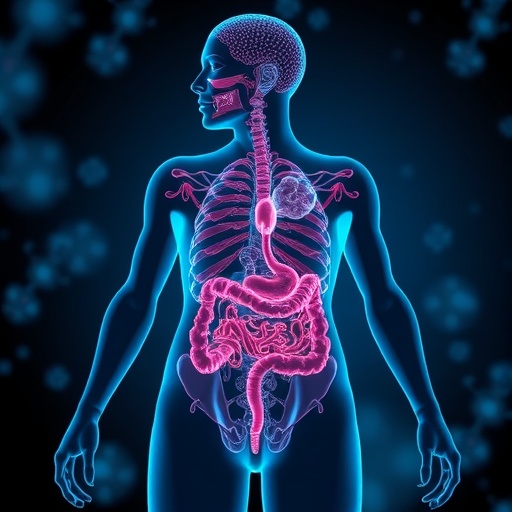Recent studies have illuminated the pivotal role of gut microbiota in human health, particularly concerning age-related health issues such as cognitive decline, oxidative stress, and gut inflammation. A groundbreaking study conducted by Wuttisa et al. offers promising insights into the potential of a novel gut microbiota supplement designed to mitigate these age-associated ailments. By focusing on the intricate relationship between gut health and brain function, the researchers find a compelling argument for the proactive use of microbiota manipulations in aging populations.
The study posits that the gut microbiome, comprising trillions of microorganisms, plays an essential role in the inflammatory processes that contribute to aging. With the aging population growing globally, addressing inflammation linked to metabolic disorders and cognitive decline is becoming more urgent. This research evaluates how specific gut microbiota could serve as a therapeutic avenue to alleviate these health issues.
Wuttisa and colleagues conducted their experiments using aged mice as a model organism, given their physiological similarities to human aging concerning immune responses and cognitive processes. Their approach highlights the relevance of gut microbiota not just in digestion but also in modulating systemic inflammation—a substantial contributor to cognitive impairment and related disorders. The findings from this comparative study underscore that targeted supplementation can effectively alter the gut microbial composition and, by extension, influence associated health markers.
One of the most compelling findings of the study is the inflammatory reduction observed in aged subjects receiving the novel microbiota supplement. Through meticulous tracking of inflammatory markers and cytokine levels, the researchers illustrated a striking decline in gut inflammation post-treatment. This suggests a dual benefit of such dietary interventions: lessening inflammation while possibly enhancing systemic immunity, which tends to wane with age.
Importantly, the supplement’s influence wasn’t restricted to inflammatory responses. The study notes a significant amelioration in oxidative stress levels observed within the aged mice. Oxidative stress, characterized by an imbalance between reactive oxygen species and antioxidants in the body, is often exacerbated by age and is a known contributor to neurodegenerative diseases. This research finds a direct connection between gut microbiota supplementation and an enhanced antioxidant capacity, hinting at a viable strategy to combat oxidative damage prevalent in aging.
Cognitive function in aged mice also revealed substantial improvement post-supplementation, as assessed through a series of behavioral tests designed to measure learning and memory capabilities. These cognitive enhancements point to the fascinating possibility that gut microbiota can influence brain performance, aligning with the emerging concept of the gut-brain axis. This axis illustrates how gut health may directly intertwine with brain health, supported by the observed results.
However, these promising findings prompt further inquiries regarding the mechanistic pathways of how gut microbiota exert these influences. Subsequent research could delve into the specific strains of bacteria responsible for these beneficial effects and how they modulate neurotransmitter production or brain-derived neurotrophic factor (BDNF) levels. Understanding these mechanisms may aid in developing targeted probiotics or dietary modifications for therapeutic use in aging populations.
Moreover, this revelation bears importance not only for those experiencing the natural decline due to aging but also for tackling various other conditions linked to gut health. The potential for gut microbiota moderation to extend beyond cognitive enhancement into areas of metabolic health and chronic inflammation presents an exciting opportunity for expansive research and development.
As the study highlights, the continued investigation into gut microbiota supplements could offer a non-invasive therapeutic option to address multifactorial age-related decline, diverging from traditional medical interventions that often come with significant side effects or invasive procedures.
In conclusion, Wuttisa et al.’s research showcases how gut microbiota supplementation can significantly affect chronic inflammation, oxidative stress, and cognitive function in aged mice. Such findings could form the groundwork for innovative supplementary products aimed at enhancing the health and longevity of aging individuals. The results also underscore the urgency for extensive clinical trials to transition these animal model findings to human applications effectively, paving the way for a new frontier in holistic aging management strategies.
As this field continues to evolve, the convergence of microbiology, neurology, and gerontology will likely yield transformative advances, potentially redefining our approach to aging and health maintenance. The implications of this research warrant attention across medical fields from dietary health to pharmacology, demonstrating an integrated understanding of the interconnectedness of our body systems.
Subject of Research: The potential of novel gut microbiota supplements in alleviating age-related inflammation and cognitive decline.
Article Title: Correction: The potential of novel gut microbiota supplement in mitigating gut inflammation, alleviating oxidative stress linked to aging, and improving cognitive function in aged mice.
Article References:
Wuttisa, K., Sookpotarom, P., Poopan, B. et al. Correction: The potential of novel gut microbiota supplement in mitigating gut inflammation, alleviating oxidative stress linked to aging, and improving cognitive function in aged mice. BMC Complement Med Ther 25, 403 (2025). https://doi.org/10.1186/s12906-025-05163-8
Image Credits: AI Generated
DOI: 10.1186/s12906-025-05163-8
Keywords: gut microbiota, cognitive function, aging, oxidative stress, inflammation, dietary supplements, gut-brain axis.
Tags: age-related health issues solutionsaged mice model for researchaging and gut healthcognitive decline and gut microbiomegut health and brain functiongut microbiota supplementationinflammation and agingmetabolic disorders in elderlymicrobiota manipulation for healthnovel supplements for aging populationoxidative stress in agingtherapeutic gut microbiota interventions





